
Modern paganism, also known as contemporary paganism and neopaganism, is a term for a religion or a family of religions which is influenced by the various historical pre-Christian beliefs of pre-modern peoples in Europe and adjacent areas of North Africa and the Near East. Although they share similarities, contemporary pagan movements are diverse and as a result, they do not share a single set of beliefs, practices, or texts. Scholars of religion may characterise these traditions as new religious movements. Some academics who study the phenomenon treat it as a movement that is divided into different religions while others characterize it as a single religion of which different pagan faiths are denominations.
Orthodox, Orthodoxy, or Orthodoxism may refer to:
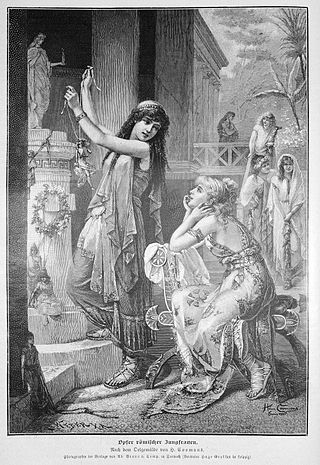
Paganism is a term first used in the fourth century by early Christians for people in the Roman Empire who practiced polytheism, or ethnic religions other than Judaism. In the time of the Roman empire, individuals fell into the pagan class either because they were increasingly rural and provincial relative to the Christian population, or because they were not milites Christi. Alternative terms used in Christian texts were hellene, gentile, and heathen. Ritual sacrifice was an integral part of ancient Graeco-Roman religion and was regarded as an indication of whether a person was pagan or Christian. Paganism has broadly connoted the "religion of the peasantry".
Slavic, Slav or Slavonic may refer to:

Slavs are the largest European ethnolinguistic group. They speak the various Slavic languages, belonging to the larger Balto-Slavic branch of the Indo-European languages. Slavs are geographically distributed throughout northern Eurasia, mainly inhabiting Central, Eastern and Southeastern Europe. A large Slavic minority is also scattered across the Baltic states and Central Asia, while a substantial Slavic diaspora is found throughout the Americas, as a result of immigration.
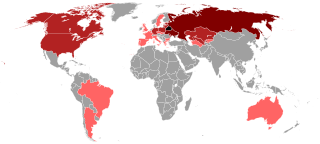
Belarusians are an East Slavic ethnic group native to Belarus. Over 9.5 million people proclaim Belarusian ethnicity worldwide. Nearly 8 million Belarusians reside in Belarus, with the United States and Russia being home to more than half a million Belarusians each.

Ukrainian is an East Slavic language of the Indo-European language family, spoken primarily in Ukraine. It is the native language of Ukrainians.

Slavic mythology or Slavic religion is the religious beliefs, myths, and ritual practices of the Slavs before Christianisation, which occurred at various stages between the 8th and the 13th century. The South Slavs, who likely settled in the Balkan Peninsula during the 6th–7th centuries AD, bordering with the Byzantine Empire to the south, came under the sphere of influence of Eastern Christianity, beginning with the creation of writing systems for Slavic languages in 855 by the brothers Saints Cyril and Methodius and the adoption of Christianity in Bulgaria in 864 and 863 in Great Moravia. The East Slavs followed with the official adoption in 988 by Vladimir the Great of Kievan Rus'.
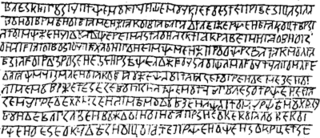
The Book of Veles is a literary forgery purporting to be a text of ancient Slavic religion and history supposedly written on wooden planks.
Ruthenian or Ruthene may refer to:
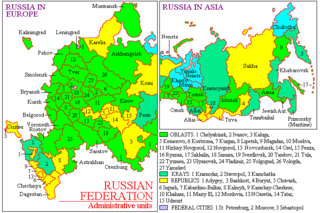
European Russia is the western and most populated part of Russia. It is geographically situated in Europe, as opposed to the country's sparsely populated and vastly larger eastern part, which is situated in Asia, encompassing the entire northern region of the continent. The Ural Mountains divide Russia into two parts, bisecting the Eurasian supercontinent. European Russia covers the vast majority of Eastern Europe, and spans roughly 40% of Europe's total landmass, with over 15% of its total population, making Russia the largest and most populous country in Europe.

A bogatyr or vityaz is a stock character in medieval East Slavic legends, akin to a Western European knight-errant. Bogatyrs appear mainly in Rus' epic poems—bylinas. Historically, they came into existence during the reign of Vladimir the Great as part of his elite warriors (druzhina), akin to Knights of the Round Table. Tradition describes bogatyrs as warriors of immense strength, courage and bravery, rarely using magic while fighting enemies in order to maintain the "loosely based on historical fact" aspect of bylinas. They are characterized as having resounding voices, with patriotic and religious pursuits, defending Rus' from foreign enemies and their religion. In modern Russian, the word bogatyr labels a courageous hero, an athlete or a physically strong man.
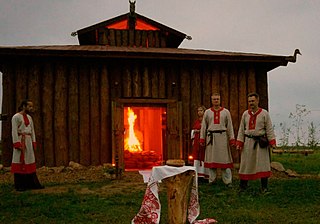
The Slavic Native Faith, commonly known as Rodnovery and sometimes as Slavic Neopaganism, is a modern Pagan religion. Classified as a new religious movement, its practitioners hearken back to the historical belief systems of the Slavic peoples of Central and Eastern Europe, though the movement is inclusive of external influences and hosts a variety of currents. "Rodnovery" is a widely accepted self-descriptor within the community, although there are Rodnover organisations which further characterise the religion as Vedism, Orthodoxy, and Old Belief.
Slavianism or Slavism is a general term for Slavic culture, civilization and identity. It may refer to:
Hindu denominations, sampradayas, traditions, movements, and sects are traditions and sub-traditions within Hinduism centered on one or more gods or goddesses, such as Vishnu, Shiva, Shakti and so on. The term sampradaya is used for branches with a particular founder-guru with a particular philosophy.

Slavic fantasy is a sub-genre of contemporary art that developed in the late 90s and early 2000s. Slavic fantasy is distinguished by the incorporation of Slavic folklore, legends, bylinas, and myths into the general canons of fantasy literature. However, its genre boundaries remain indistinct.
Modern paganism, also known as contemporary paganism and neopaganism, is a collective term for new religious movements which are influenced by or derived from the various historical pagan beliefs of pre-modern peoples. Although they share similarities, contemporary pagan religious movements are diverse, and as a result, they do not share a single set of beliefs, practices, or texts.










